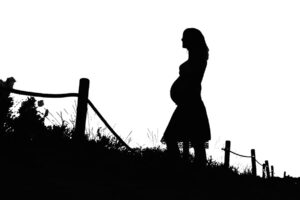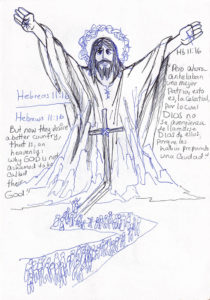Prolife After Dobbs – Who Will Care for the Mothers and Babies?
The joy of many after the Supreme Court ruling to leave abortion decisions to the states should spark a big response among Catholics to respond to many more pregnant women who will be in need. Prolife groups who give baby furniture, diapers, and clothing are to be commended, but where will homeless pregnant women live? Who will help them to get started again after they have their babies? Who will help the couples who are on the edge financially and now have more mouths to feed? Who will care for the babies so that the mothers can go to work?
At Casa Juan Diego we have always tried to receive pregnant undocumented women so they will not be homeless. It is difficult now because we are swamped every day with new immigrants and refugees – literally no room in the inn, even overflowing.
However, when we received a call from a Catholic prolife group this morning, we found a way to make a space. The pregnant woman, the caller said, is at 39 weeks and may give birth any day. She is living in a garage that has no air conditioning. (We paid the way for a family currently living at Casa Juan Diego to go to New York and thus a bed opened up, even though others are on overflow cots if we can receive them at all.)
We pray that Catholics will open homes (or even their own homes) to receive pregnant women who have no resources. Unfortunately, Casa Juan Diego cannot serve the whole city of Houston. We pray that there will be a strong Catholic organizing effort for universal day care so that the mothers can begin to work and the babies will be safely cared for.
Anyone who is in need of food can come to Casa Juan Diego once a week for groceries – including pregnant women and new mothers and families with children. It is not fancy food, but very basic. It can help to keep people alive.
Many times when people come for food, they ask if we have diapers for their babies or toddlers. We are so busy with our guests and their needs and the hundreds who come for food each week that we could not possibly keep up with giving out disposable diapers, even if we had them. And we would only be contributing to the massive landfills. For some time now we have been purchasing cloth diapers, waterproof pants, and special safety pins for babies. Some people do not wish to accept the cloth diapers when we offer them, but the poorest and the desperate, who are growing each day, are very glad to receive them. (There is also a middle-class movement to use cloth diapers to help to save the environment.)
God Will Say, Where Are the Others?
French poet Charles Péguy said, When we get to heaven, God will say to us, where are the others? Dorothy Day quoted Péguy on this in her original statement of the Aims and Purposes of the Catholic Worker movement. The gentle personalism of the CW means personally responding to Jesus who comes to us in the disguise of the poor, not waiting for the government or whatever hierarchy to decide what we should do. We hope that if we are fortunate enough to get to heaven, the Father will not have to call us out for ignoring the others who are his children.
The Works of Mercy, as some have criticized them, are not coddling, but trying to live the words of Jesus, as he asks us to do in John 14 and Matthew 25. We are cautious, however. For example, before adding people to our sick and injured list for the disabled for those who cannot receive government help, we ask to see the hospital papers for their diagnosis.
Sonia (not her real name) came for the first time several months ago, walking from the car that had brought her, bringing her oxygen tank behind her up to the table where we give out groceries. She was noticeably pregnant. Sonia explained that she had had COVID when she was four months pregnant. We added her to our sick and injured program and helped with rent and groceries. When Sonia visited last week to seek more help for the month (still with her oxygen), we asked about the baby. Her baby was born blind in one eye and had other complications from her mother’s COVID when she was in the womb. Sonia, still with her oxygen, will now have to have surgery for her kidney. The baby has to have a special formula; she is hoping to be able to find it, with the help of her pediatrician.
José (a fairly young man) had a stroke and has been coming to us for help with the rent for the one room he lives in. We assist with food and his small rent as he arrives each month with his walker and cart for groceries. One day he came into the entrance and saw a lovely comfortable armchair that had been donated. He asked If he could have it. We said yes, and Kevin drove to the place where he rents with the chair. The only furniture in the room was a bed; he had had nowhere to sit. When he came recently for groceries, Jose told one of our volunteers that he would be unable to live without Casa Juan Diego. He has nothing except what we give him – $300 to his landlord each month, groceries and toilet paper and dishes soap, occasionally some toiletries, and MetroLift tickets. Once we gave him a hooded sweatshirt.
Anita, an immigrant woman from El Salvador who says she cannot return to her country arrived in a wheel chair and with a special boot on her leg, holding her two-month-old baby in her arms. Two neighbors had driven her to Casa Juan Diego. A tumor had ruptured during her pregnancy. The first question we asked was, do you have formula for your baby? She had less than an inch in a can. We brought her one of the cans of formula (not the recall brand) which volunteers had bought for us when the news first came out that so much of the baby formula was contaminated. After that we talked with her about her rent and provided an ample box of food for her. She will come back each month for as long as necessary.
Armando came, struggling to walk with a cane after his stroke. He asked our help to pay the rent. His son had been helping him but could no longer do so because he had been hospitalized after being diagnosed with schizophrenia. I couldn’t understand Armando’s speech enough to decipher the name of the apartments, so he called his wife so that she could explain. Volunteers, including permanent deacon candidates who have been placed at Casa Juan Diego for service hours, helped take his box of food out under the shade tree where he could wait for MetroLift to pick him up.
A woman came yesterday to ask for a walker for her mother who had suddenly been hospitalized and could not walk on her own. We had one for her. When wheel chairs are donated, we are very happy to be able to give them to those who come to ask for one for their relative who has recently been ill or disabled. We also have a large room filled with adult diapers, some pull-ups and some with tape fastening for the bedbound. Those on our list of the sick and injured but others also in need of them regularly come to ask for those diapers—expensive to buy. Donations greatly appreciated.
We Catholic Workers are just a few doing this work at Casa Juan Diego. We would not be able to do it at all without the support of our readers, the many who participate in our work from afar. We also depend on food donated from the Houston Food Bank. We would not be able to do so much if our own guests and the many part-time volunteers did not help each day with the Works of Mercy, bagging groceries, sweeping and mopping the floors, trying to keep up as so many come to our doors. We often comment with a bit of irony, that it is beautiful to do the Works of Mercy, but they require a lot of work – manual work.
Houston Catholic Worker, Vol. XLII, No. 3, July-September 2022.



